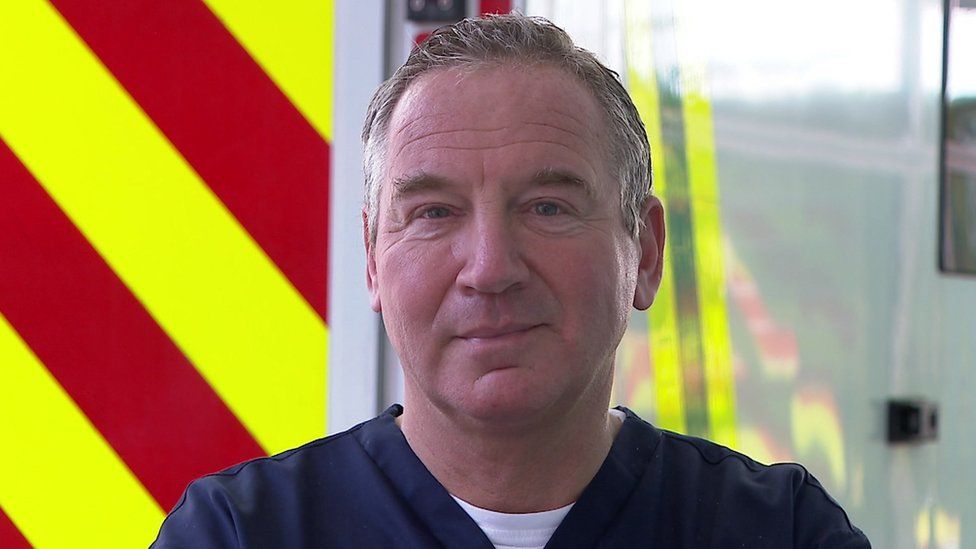 The NHS in England was ill-prepared for the seismic shock of the Covid pandemic, a hospital chief has said.
The NHS in England was ill-prepared for the seismic shock of the Covid pandemic, a hospital chief has said.
The NHS in England was ill-prepared for the seismic shock of the Covid pandemic, a hospital chief has said.
The service was already running at nearly full capacity with long waits for non-urgent operations even before coronavirus arrived, according to Prof Marcel Levi, the University College London Hospitals trust's chief executive.
Prof Levi leaves his role at the end of March, after four years, to return to his native Holland to become chief scientific adviser to the Dutch government.
In a BBC interview, he argues that it could take "a very long time" to clear the backlog of routine surgery and procedures which has built up because of cancellations during the pandemic. He says more money will be needed quickly to run weekend and evening sessions in operating theatres.
Prof Levi also believes the most successful responses to the pandemic were those under the control of the NHS - in contrast to those which were run by independent contractors.
"If you want to get something done, ask the NHS and don't outsource it to all these private companies," he said.
Prof Levi started his job in London having been chairman of the executive board of the Academic Medical Centre at the University of Amsterdam.
A magazine in the Netherlands named him as Dutchman of the year in 2016. He is a practising consultant, and continued seeing patients as well as carrying out his chief executive role.
He believes hospitals coped extremely well in the face of intense pressure when infection rates surged during the second wave in early 2021.
"I do not think there is any country with such a high number of Covid patients presenting with such a steep rise like we've seen in January and February, that were dealt with in any health system in such a proper way," he said.
"So I'm very proud of how the NHS behaved and acted with the skill available to provide sufficient hospital care for what patients needed."
However, the first wave was a very different story. He says the NHS was not as robust as it should have been, a key factor being that the UK was one of the countries with the lowest number of intensive care beds per 1,000 of population.
"You cannot run a healthcare system at the capacity we run the NHS. We are always 95% full, so it's impossible to quickly respond to an emergency situation."
Every winter with influenza circulating there are peaks in demand, resulting in cancellations of operations because there is not enough intensive care space.
"We should have seen that and said this is just flu, what would happen if we had a real pandemic - and then we would probably have been better prepared."
The same argument applies to routine surgery and procedures: there were already long waiting lists even before the pandemic started.
More than 300,000 patients have waited more than a year in England, but Prof Levi points out they had waited a long time before Covid forced hospitals to postpone operations.
"Covid is actually a magnifying glass, making it clear that capacity in the NHS is not sufficient - that has now become very obvious. It's going to take, I am afraid, a very long time to get where we want to be."
Prof Levi's comments came as Health Secretary Matt Hancock announced £6.6 billion extra for health and care in England in the first half of the 2021/22 financial year.
Mr Hancock told MPs the money was in addition to funding committed as part of the spending review to help the NHS meet additional Covid costs and starting work on the elective recovery.
Prof Levi's analysis makes sobering reading, because he has experience of other health systems, and has seen the front line in the UK with a fresh perspective.
But he also believes that the NHS has many strengths - and takes a swipe at the use of private contractors in some areas of the Covid response.
"Everything that has been a big success - addressing these massive peaks for patients needing intensive care and also vaccination - was the part done by the NHS.
"Everything that was actually not so successful - test-and-trace, PPE provision, all these things - was outsourced to companies which failed to deliver what they promised.
"That is a reminder for the future - the NHS is a very strong organisation. If you want to get something done ask the NHS and not outsource it to all these private companies."
And the best thing about the NHS? The people who work in it, he said.
"The resilience and the quality and the camaraderie of people I have been working with - doctors, nurses, allied health professionals, porters, cleaners, teamwork - that's something I have never encountered before."
Hugh Pym
Health editor
@BBCHughPymon Twitter